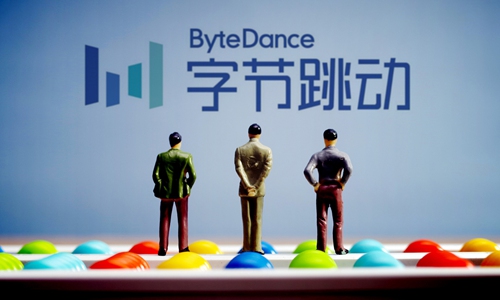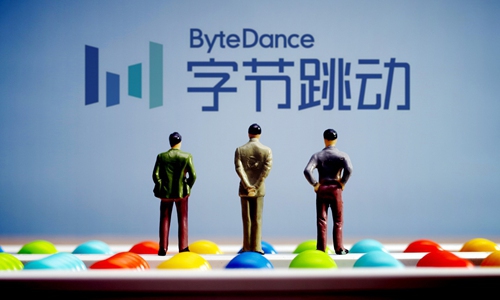Some Chinese netizens side with Douyin in lawsuit against Tencent over alleged monopoly abuse
High-profile anti-monopoly litigation in China to have life and death consequences

ByteDance. Photo: VCG
Some Chinese netizens on Wednesday sided with Chinese internet upstart ByteDance, which owns Douyin - China's domestic version of TikTok - in its lawsuit against domestic internet giant Tencent over alleged monopoly abuse.
It's the first clash among China's internet titans after the introduction of a new regulation governing internet platforms' monopolistic behaviors. Analysts said that the case will set a precedent for future rulings and have an industry-wide impact.
ByteDance, owner of TikTok, has in recent months faced former US President Donald Trump's executive order ban and "forced sale coercion." It seized on a rising trend of tightening anti-monopoly regulation in China to file a lawsuit against Tencent on Tuesday, alleging the latter had abused its dominant market position and treated consumer data as its "private property."
Specifically, users cannot share their favorite Douyin content via the WeChat platform, which has 1.2 billion active users, and Tencent has been doing this for three years.
Tencent has a ban similar to other internet companies. For example, users of Alibaba's Taobao online marketplace cannot directly share a purchase with their friends on WeChat.
Douyin asked the court to tell Tencent to lift a ban of the company and order a compensation totaling 90 million yuan ($13.9 million).
The case filed by ByteDance came as the Spring Festival holidays draw near and the digital economy is set to play a major role. Short video platforms such as Douyin and its smaller rival kuaishou are expected to dominate people's holidays.
Kuaishou, which is being floated in the Hong Kong stock market, is backed by Tencent.
According to an online poll on China's Twitter-like social media Sina Weibo as of press time, some 31,000 netizens sided with Douyin and 16,000 went for Tencent. Some 8,500 supported neither. The spat has gained over 320 million views.
Tencent, for its part, vowed to launch a countersuit.
Internet giants in China have a long history of suing each other. A series of lawsuits between Qihoo 360 and Tencent, known in China as the "Battle of the Three Qs" due to Tencent's popular instant messenger QQ, lasted from 2010-14. At that time, the Supreme People's Court ruled that QQ did not have a monopoly position in the market.
With little information available, the case is still closely watched by legal experts, as the internet eyeball economy reached a plateau and incumbent players have attached growing focus to cultivating their existing users.
However, Li Junhui, a professor at the China University of Political Science and Law, said ByteDance has a fair chance of winning the lawsuit this time, given that the Chinese government is tightening up relevant regulations on monopolies in the internet sphere.
"Restricted openness to others is a sign that platforms are reluctant to honor their responsibilities after getting big," Li told the Global Times, noting that there is a prevalent tendency to wall off the internet sphere and save the customer base for internal use.
ByteDance's move caused a sensation in the market as the cause for the lawsuit is convincing and conforms with the aspirations of the public, Yao Conghui, a lawyer with German-based Schulz Noack Bärwinkel law firm, told the Global Times on Wednesday. Yao expected the lawsuit to be settled within the next six to 12 months.
"Tencent has harmed the rights of common users by blocking links to Douyin just to retain users. Large internet platforms have created a lot of monopolistic contracts which are hard to cross for business and users. If the government doesn't assume the control, it will damage the personal interests of users in the end," she said.
"That's the rub," said Zhang Yi, CEO of Shenzhen-based iiMedia Research. "Will the government weigh in with anti-monopolistic regulation of Tencent or tend to treat this as a case of competition among market rivals?"
Compared with foreign technology companies, Chinese internet companies have enjoyed a decade of wild growth largely unchecked by government regulation. Experts said that in general this has led the Chinese internet economy to grow, but it had some consequences.
Taobao and JD.com, the country's leading e-commerce market places, used to force vendors to choose exclusively on which platform they wanted to operate their online business.
Unfair competition among leading internet platforms often resulted in those platforms trading sharp barbs - a phenomenon of the disorderly competition in the Chinese internet economy, Li said.
"Power should come with self-discipline and a desire to serve the users. Freedom has a price. Internet giants have to learn to respect competitors and users," Yao said, noting that European and US internet companies have better industry self-regulation and face stronger external regulation.
Zhang predicted that the lawsuit will have several rounds, like those between internet giants years ago, and the case will eventually find its way to the Supreme Court as this legal battle will lead to life and death consequences.
ByteDance is determined to transform itself from a media company into a social media platform which will get a higher valuation from capital market investors.
For Tencent, which overlooked ByteDance's sudden rise to stardom and fell unexpectedly behind in the race of short-form videos, seen by many as the more appealing form of media consumption, the lawsuit will be a battle that shapes its future existence.
"ByteDance is trying to tie the knot around Tencent's neck," Zhang said, predicting that Tencent will continue to stall Douyin on its WeChat instant messaging platform for as long as possible and deny Douyin the chance of growing its own vegetable in Tencent's garden.



